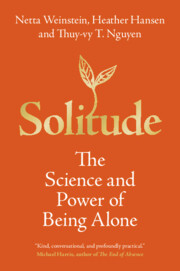2 results
4 - Aloneness as Connector in Arabic Papyrus Letters of Request
- from Part I - Personal ties
-
-
- Book:
- Mechanisms of Social Dependency in the Early Islamic Empire
- Published online:
- 06 December 2024
- Print publication:
- 28 November 2024, pp 127-149
-
- Chapter
-
- You have access
- Open access
- Export citation

Solitude
- The Science and Power of Being Alone
-
- Published online:
- 24 March 2024
- Print publication:
- 18 April 2024

